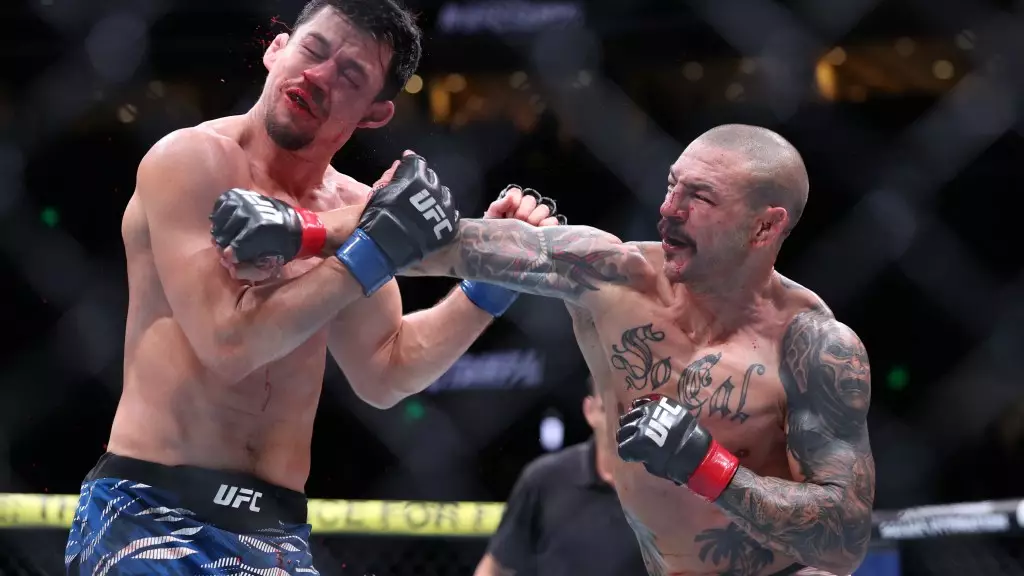Cub Swanson, a name that resonates with mixed martial arts (MMA) enthusiasts, finds himself at a critical crossroads in his career. Recently competing in the co-main event at UFC on ESPN 63, Swanson showcased his enduring skills, defeating Billy Quarantillo in a bout that thrilled fans and earned him the “Fight of the Night” bonus. Yet, beneath the excitement lies a deeper narrative—a contemplation of life post-retirement, the joys of fatherhood, and the thrill of coaching.
Swanson’s performance at Amalie Arena was not merely a fight; it was a revival of the spirit that defined the World Extreme Cagefighting (WEC) era. At 41 years old, with a professional record of 30-14, he demonstrated that age does not diminish prowess; rather, it can enhance strategy and skill. As he delivered a decisive knockout victory, Swanson did more than win; he reconnected with the fervor of an older generation of fighters and fans. This moment served as a reminder of the fierce competitiveness that can arise from years of experience.
However, the joy of victory quickly mingled with introspection as Swanson expressed uncertainty about the future. He acknowledged the common experience of fighters contemplating retirement but also recognized his unique position. Swanson’s perception of fighting has evolved. He does not currently feel the overwhelming need to continue competing but remains open to the possibilities that the future may hold.
Swanson’s personal life weighs heavily on his decision-making process. As a father of three, his responsibilities extend beyond the octagon. The notion of being a role model and spending quality time with his children has become increasingly significant. This sentiment is not uncommon among fighters who, after years of competition, find themselves seeking balance between career and family. Swanson’s journey points to an underlying truth: family often becomes a pivotal influence in a fighter’s choice to retire or continue.
In addition to his role as a father, Swanson has embraced coaching and mentoring young fighters through his Team Bloodline. His desire to impart knowledge and experience is palpable, reflecting a shift from self-centered pursuit to one that fosters community and development. Swanson articulated this beautifully, stating that the fulfillment he derives from coaching outweighs the injuries and pressures of being an active fighter. This shift is an important reminder that not all fighters aspire to remain in the spotlight indefinitely—many find satisfaction in nurturing the next generation.
Swanson’s reflections on retirement reveal the internal conflict many fighters face. The lure of the cage can be intoxicating, with each fight representing an opportunity to relive the adrenaline rush that accompanies competition. Yet, as he remarked, “It’s a tough decision.” The reality of life after fighting poses its own set of challenges, accentuated by the loss of his manager during the COVID pandemic—a poignant moment that forced him to reevaluate his life and priorities.
Experiencing such a loss thrust Swanson into a period of reflection, making him acutely aware of the transient nature of a fighting career. This realization—while painful—has equipped him with the clarity needed to look beyond the immediate pleasures of competition. He has emphasized the importance of not just existing within the fighting world but actively planning for a future that transcends it.
Ultimately, Swanson’s desire to return to the cage hinges on finding an exciting opportunity that ignites his passion. He expressed that any potential comeback would need to be compelling enough to draw him away from the fulfilling path of coaching. The realization that “there is life after fighting” resonates powerfully in his narrative. Many fighters struggle with this transition, but Swanson appears to be navigating his own course with wisdom and foresight.
Cub Swanson’s story is one of evolution, reflection, and ambition. As he stands on the precipice of a potential retirement, he reveals the complexities of balancing a fighting career with family and mentorship. His journey highlights the rich tapestry of experiences that shape a fighter’s life beyond the octagon, reminding us all that each decision is as much about personal growth as it is about professional achievements. Whether he ultimately chooses to step away from competition or finds his way back to the cage, one thing is clear: Swanson’s legacy will extend far beyond his fighting record.

